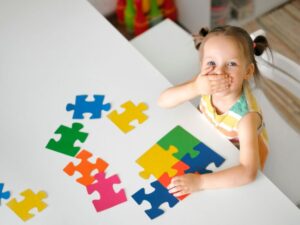Back to: Pre Vocational Studies JSS 3
Welcome to class!
In today’s class, we shall be talking about the conditions necessary for child development. I trust you will enjoy the class!
Conditions Necessary for Child Development

Child development is a complex process influenced by a variety of factors, both biological and environmental. To support optimal child development, it is essential to create conditions that foster physical, cognitive, social, and emotional growth. These conditions are interconnected and mutually reinforcing, working together to shape a child’s development.
Physical Conditions
- Safe and Healthy Environment: A safe and healthy environment is crucial for a child’s physical development. This includes a clean and hygienic living space, access to nutritious food, and protection from hazards such as lead exposure, pollution, and accidents.
- Adequate Nutrition: Good nutrition is essential for a child’s growth and development. Children need a balanced diet that provides essential nutrients, vitamins, and minerals. Malnutrition can lead to physical and cognitive delays, weakened immune systems, and increased susceptibility to diseases.
- Regular Exercise: Physical activity is important for a child’s physical health, motor skills, and overall well-being. Encourage children to engage in regular exercise, such as playing outdoors, participating in sports, or doing simple exercises at home.
- Adequate Sleep: Sufficient sleep is essential for a child’s physical and cognitive development. Children need adequate sleep to grow, repair tissues, and consolidate memories. Ensure that children have a regular sleep schedule and a comfortable sleep environment.
- Medical Care: Regular medical check-ups and vaccinations are crucial for a child’s health and development. Preventative care can help identify and address potential health problems early on.
Cognitive Conditions

- Stimulating Environment: Provide a stimulating environment that encourages learning and exploration. This includes access to books, toys, games, and opportunities for creativity. A stimulating environment helps children develop curiosity, problem-solving skills, and a love of learning.
- Intellectual Stimulation: Engage children in activities that stimulate their minds, such as puzzles, problem-solving, and critical thinking. These activities help children develop cognitive skills, such as memory, attention, and reasoning.
- Language Development: Encourage language development by reading to children, talking with them, and providing opportunities for them to express themselves verbally. Language development is essential for communication, learning, and social interactions.
- Early Childhood Education: Consider enrolling children in quality early childhood education programs to support their cognitive development and social skills. Early childhood education can provide children with a solid foundation for future learning and success.
Social and Emotional Conditions

- Love and Affection: Children need love, affection, and emotional support from their caregivers. This helps them develop a sense of security, belonging, and self-worth.
- Positive Relationships: Foster positive relationships with family, friends, and peers. These relationships can help children develop social skills, empathy, and a sense of belonging.
- Role Models: Provide positive role models who children can look up to and learn from. Role models can influence a child’s values, beliefs, and behaviors.
- Limit Screen Time: Limit screen time, including television, computers, and smartphones, as excessive screen time can have negative effects on a child’s development, including social skills, sleep, and physical activity.
- Encourage Social Interaction: Facilitate opportunities for children to interact with others, such as playdates, sports, or extracurricular activities. Social interaction helps children develop social skills, empathy, and a sense of community.
Summary
Creating conditions that support child development requires a holistic approach that addresses physical, cognitive, social, and emotional needs. By providing a safe and nurturing environment, stimulating opportunities for learning, and fostering positive relationships, parents, caregivers, and educators can help children reach their full potential. It is important to remember that each child is unique and may have different developmental needs. By tailoring your approach to the individual child, you can provide the best possible support for their growth and development.
Questions
- What are the essential physical conditions for child development?
- How does nutrition affect a child’s growth and development?
- Why is regular exercise important for children?
- What kind of environment is conducive to cognitive development?
- How can parents stimulate a child’s intellectual growth?
We have come to the end of today’s class. I hope you enjoyed the class!
In the next class, we shall be talking about Care for the child
In case you require further assistance or have any questions, feel free to ask in the comment section below, and trust us to respond as soon as possible. Well done so far and See you in the next class!
